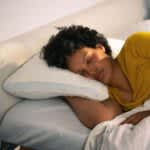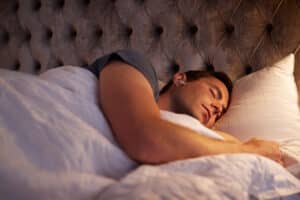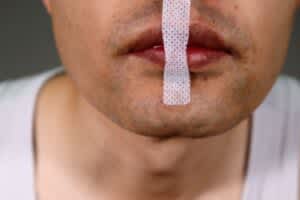At a Glance:
- 26.8% of U.S. adults who traveled in the past year have experienced travel fatigue, or lingering tiredness that comes from traveling, according to a survey.
- In the past year, 35.8% of adults have had travel fatigue or jet lag, which is an alteration to our circadian rhythms.
- Adults with travel fatigue are 39.5% more likely to also have insomnia.
- Adults with travel fatigue average 23 travel days a year, 9.5% more than average.
- Business travelers are more prone to travel fatigue than adults who don’t travel for business.
Emily Pennington is a 35-year-old travel writer who recently spent a year visiting all of the U.S. national parks for a book. It was a dream assignment. But she returned to her Los Angeles home feeling disoriented, exhausted, and lethargic.
“It felt so jarring, like every little city sound was irking my nervous system,” Pennington says. “I couldn’t sleep. I couldn’t handle the traffic. I couldn’t handle basic life tasks.”
According to Dr. Michael J. Breus, Ph.D., of The Sleep Doctor, Pennington’s symptoms are classic indicators of travel fatigue, jet lag’s lesser-known cousin. While jet lag is a sleep disorder that occurs when your internal biological clock doesn’t align with your destination’s real-life clock, travel fatigue is tiredness that doesn’t depend on time zones.
“It’s more about the exhaustion you feel from traveling,” Dr. Breus says.

Some 26.8% of U.S. adults who traveled in the past year have experienced travel fatigue, according to The Sleep Doctor’s survey in February 2023. More than one-third of respondents (35.8%) reported experiencing travel fatigue or jet lag. Those numbers may grow, with travel up 9% this past February compared to a year prior and 49% of Americans saying they plan to travel more in 2023 than they did in 2022.
What else do we know about travel fatigue, and what can we do about it?
Does Travel Frequency Make Us Fatigued?
Travel fatigue can affect anyone whose time away from home requires an overnight stay. According to the survey, it may increase with the amount we travel.
The percentage of adults who experienced travel fatigue during personal travel progressively increased from 25.4% among people who travel one to seven days a year to 38.7% among those who travel up to 60 days a year. The same was mostly true during business travel, with 35% of people who travel 31 to 60 days for business experiencing fatigue compared to 29.5% of those whose business travel is one to seven days a year.
Although there was a decrease in travel fatigue among adults whose personal travel exceeds 90 days a year, it did jump to 36.8% among those whose business travel was more than three months a year.

In turn, business travelers are slightly more likely to feel travel fatigue. Of respondents, 29.2% of business travelers reported travel fatigue compared to 24.4% of those who don’t travel for business.
Amanda Goad, 35, says she can attest to that. A brand marketing manager in Colorado, Goad recently returned from a two-month travel streak where she was gone at least every other week for work. As a result, travel fatigue hit her hard.
Shop the Best Mattresses of 2023“I spent two hours of my six-hour car ride home bawling my eyes out,” Goad says. “I was so burned out.”
Goad says she’d prefer to limit her business travel to five days a month, so she has more time to recover. That still adds up to 60 days a year.
In general, adults with travel fatigue report that they travel 9.5% more than average.
Time Spent Traveling Matters
Travel fatigue also affects folks traveling for shorter periods. When Pennington returned from a nine-day trip to Tanzania, for instance, she says she still felt exhausted and lived with “brain fog” for more than a week.

That’s just one of the symptoms of travel fatigue, as well as of jet lag. According to the survey, adults are likely to feel travel fatigue in other ways. They are:
- 64.1% more likely to lack energy;
- 39.5% more likely to have insomnia; and
- 33.9% more likely to have anxiety, which 44.2% of adults with travel fatigue experience;
They are also 46.3% more likely than the average traveler to also experience jet lag.
This indicates that people who are already exhausted from travel are also more stressed and sleep-deprived. Travel itself could be the culprit. The disruption of daily routines and new places puts our bodies on high alert. Plus, there’s the sleep debt, the difference between the sleep you need and the sleep you get, which can affect vacationers and long-haul business commuters alike. The bigger the sleep debt, the harder it is to repay.
The effects can last beyond simply feeling tired. Goad says that she was at her wit’s end after a recent trip to Park City, Utah.
“I was so exhausted and disinterested in everything by the time I got home,” she says. “I had major anxiety, and it was affecting my work. I wasn’t sleeping well, and it was making me incapable of functioning at the level I needed to. I felt like my life was filled with anxiety, stress, and sleep deprivation.”
People with travel fatigue are also more likely to feel other types of physical discomfort. More than half of respondents (53.1%) regularly experience back pain along with their travel fatigue, compared to the survey average of 45.6%. Another 40.6% have neck pain, compared to the average of 33.4%.
How Can We Recover From Travel Fatigue?
Dr. Breus advocates a pre-emptive approach to combating travel fatigue. He says to be prepared, because those who do not prepare suffer the worst. He suggests anticipating your travel needs as much as possible by bringing snacks to curb hunger during a long ride or taking a water bottle to fill up after going through airport security.
“Anything that causes any type of stress will increase your travel fatigue,” Dr. Breus says. “If you don’t have your water or medication, it’s all going to contribute.”
For Pennington, being prepared means emphasizing morning meditation to help lower her stress levels before traveling. “It wasn’t a cure-all, but it definitely helped,” she says
Dr. Breus agrees staying relaxed is key. He suggests travelers avoid alcohol, go to bed at a normal time, and use the 4-7-8 breathing technique to help lower anxiety levels.
“Maintain calm and avoid things that cause stress,” he says.
Methodology
The survey commissioned by The Sleep Doctor was conducted on the online survey platform Pollfish on Feb. 27, 2023. Results are from 1,250 survey participants in the United States who were ages 18 or older at the time of the survey and whose travels included at least one overnight stay outside the home in the prior 365 days. All respondents attested to answering the survey questions truthfully and accurately.
References
Ask the Sleep Doctor
Have questions about sleep? Submit them here! We use your questions to help us decide topics for articles, videos, and newsletters. We try to answer as many questions as possible. You can also send us an email. Please note, we cannot provide specific medical advice, and always recommend you contact your doctor for any medical matters.































